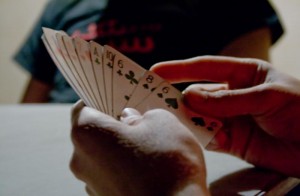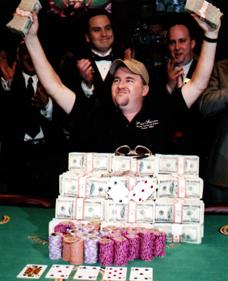
I have played cards since I was a kid.
We used to play a game called Scat, whose ultimate goal was to get thirty one (Ace and two face cards of the same suit). You played with a dollar bill, and when you thought you could beat one person you knocked. This meant everyone else got to pick up one more card. Then everyone flipped their cards over, and the low hand bends a corner of their bill. If you were low, and you knocked, then you bent twice. Once you had no more corners to bend, you were on your face. This was like Scat probation. One more misstep and you were done.
It was a simple game, that featured just enough strategy to make it interesting. From Scat I moved on to poker and blackjack. Once I realized that in poker you were losing to another person, and not a billion dollar enterprise, poker became my game of choice.
I would play whenever I could, even forming games on piles of sheets in the linen closets at the hotel where I was working. Despite loving to play, I had never watched poker on TV.
The WSOP had been played late at night on ESPN Classic, but it was hardly a marketable broadcast. You couldn’t see the cards until the hand was played, there was no production value, and the people playing had no desire to be stars and acted like, well a bunch of degenerate curmudgeons.
No one wanted to watch, and the players didn’t care whether people were watching, they wanted to win the tournament
 When Chris Moneymaker, an accountant and novice player, won the WSOP Main Event, poker blew up. Instead of a few old guys sitting around a smoky table you had people of all ages flocking to casinos and home games. It became cool.
When Chris Moneymaker, an accountant and novice player, won the WSOP Main Event, poker blew up. Instead of a few old guys sitting around a smoky table you had people of all ages flocking to casinos and home games. It became cool.
Everyone wanted to play, and everyone wanted to watch.
ESPN took advantage and rolled out around the clock coverage of the event. It got moved from The Horseshoe in Old Vegas, to the shiny new Rio, which had room for the influx of new participants. They ironed out the kinks and for a while, no matter whether you played poker or not, you would find yourself drawn to the screens. The new packaging, mixed with new players who wanted to become brands and acted as such, captured lightning in a bottle. The country had become poker crack heads, and ESPN had the best two for fives.
In an effort to reinvent themselves, ESPN is showing the 2011 WSOP Main Event live. This means that you don’t see the cards until the hand is over. I tuned in for a few minutes last night and there is also a new rule that you can’t talk about the hand while you are in it.
So after revolutionizing how poker is presented to the masses, you are sending it back to the dark ages?
If we can’t see the cards, and we can’t listen to people who have become household names explain what they’re thinking, what are we getting out of the telecast?
Bored, that’s what.
And that’s from someone who actually knows, and appreciates poker.
Poker peaked a few years ago. It will eventually settle back into the dark back rooms where it belongs. Just never thought it would be ESPN who would turn the lights off.
—–Corey
